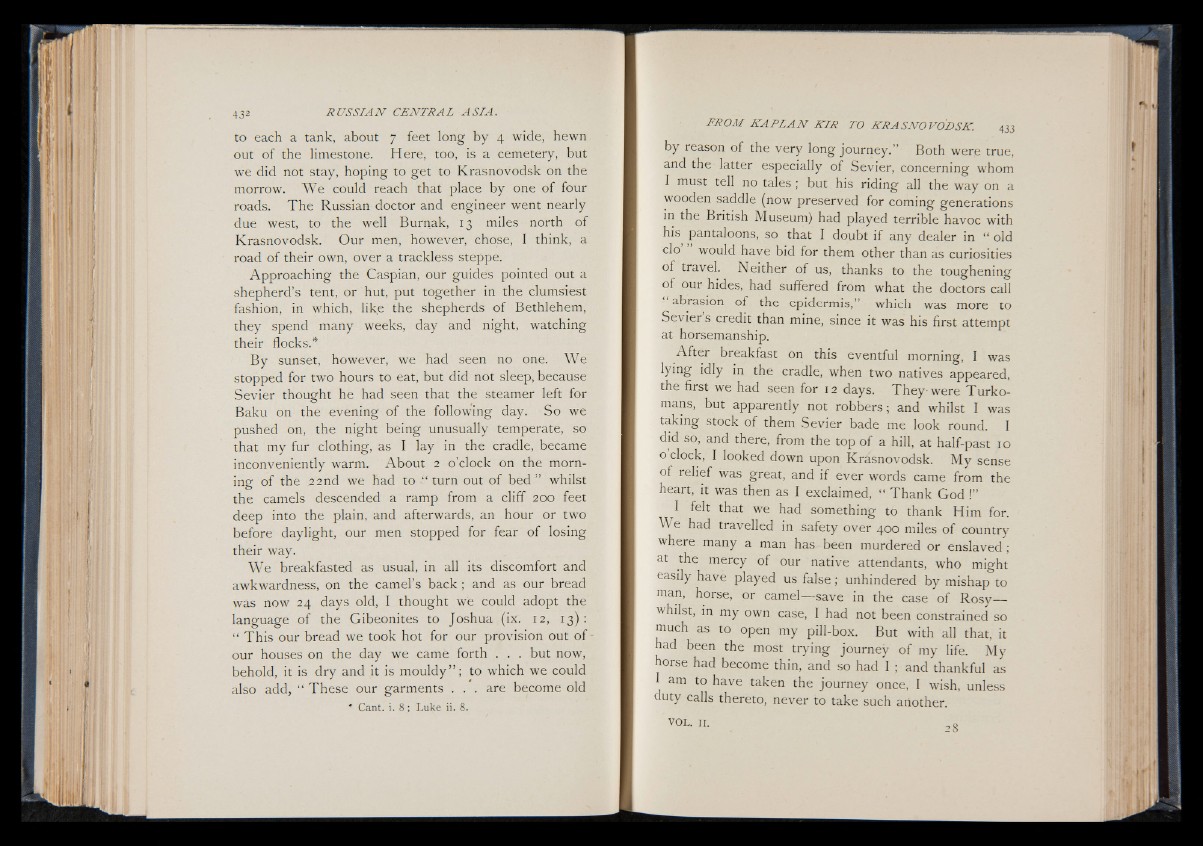
to each a tank, about 7 feet long by 4 wide, hewn
out of the limestone. Here, too, is a cemetery, but
we did not stay, hoping to get to Krasnovodsk on the
morrow. W e could reach that place by one of four
roads. The Russian doctor and engineer went nearly
due west, to the well Burnak, 13 miles north of
Krasnovodsk. Our men, however, chose, I think, a
road of their own, over a trackless steppe.
Approaching the Caspian, our guides pointed out a
shepherd’s tent, or hut, put together in the clumsiest
fashion, in which, like the shepherds of Bethlehem,
they spend many weeks, day and night, watching
their flocks.*
By sunset, however, we had seen no one. We
stopped for two hours to eat, but did not sleep, because
Sevier thought he had seen that the steamer left for
Baku on the evening of the following day. So we
pushed on, the night being unusually temperate, so
that my fur clothing, as I lay in the cradle, became
inconveniently warm. About 2 o’clock on the morning
of the 22nd we had to “ turn out of b e d ” whilst
the camels descended a ramp from a cliff 200 feet
deep into the plain, and afterwards, an hour or two
before daylight, our men stopped for fear of losing
their way.
We breakfasted as usual, in all its discomfort and
awkwardness, on the camel’s b a c k ; and as our bread
was now 24 days old, I thought we could adopt the
language of the Gibeonites to Joshua (ix. 12, 13):
“ This our bread we took hot for our provision out of
our houses on the day we came forth . . . but now,
behold, it is dry and it is mouldy” ; to which we could
also add, “ These our garments . . . are become old
* Cant. i. 8; Luke ii. 8.
by reason of the very long journey.” Both were true,
and the latter especially of Sevier, concerning whom
I must tell no ta le s ; but his riding all the way on a
wooden saddle (now preserved for coming generations
in the British Museum) had played terrible havoc with
his pantaloons, so that I doubt if any dealer in “ old
d o would have bid for them other than as curiosities
of travel. Neither of us, thanks to the toughening
of our hides, had suffered from what the doctors call
“ abrasion of the epidermis,” which was more to
Sevier s credit than mine, since it was his first attempt
at horsemanship.
After breakfast on this eventful morning, I was
lying idly in the cradle, when two natives appeared,
the first we had seen for 12 days. They-were Turkomans,
but apparently not robbers; and whilst I was
taking stock of them Sevier bade me look round. I
did so, and there, from the top of a hill, at half-past 10
0 clock, I looked down upon Krasnovodsk. My sense
of relief was great, and if ever words came from the
heart, it was then as I exclaimed, “ Thank God !”
I felt that we had something to thank Him for.
We had travelled in safety over 4c» miles of country
where many a man has been murdered or enslaved ;
at the mercy of our native attendants, who might
easily have played us fa lse ; unhindered by mishap to
man, horse, or camel— save in the case of Rosy—
whilst, in my own case, I had not been constrained so
much as to open my pill-box. But with all that, it
had been the most trying journey o f my life. My
horse had become thin, and so had I ; and thankful as
1 am to have taken the journey once, I wish, unless
duty calls thereto, never to take such another.